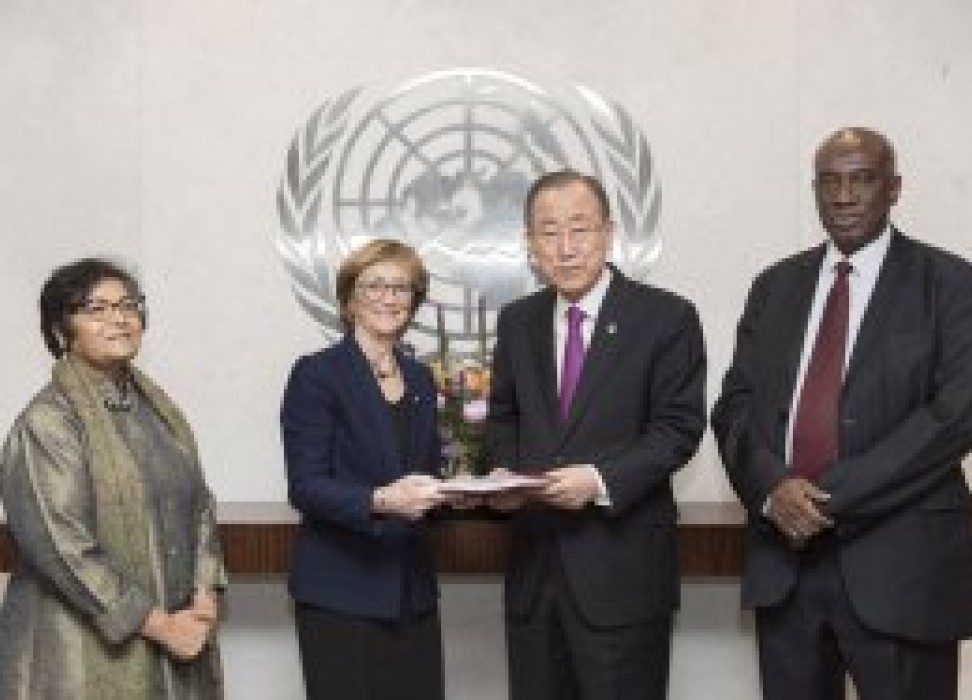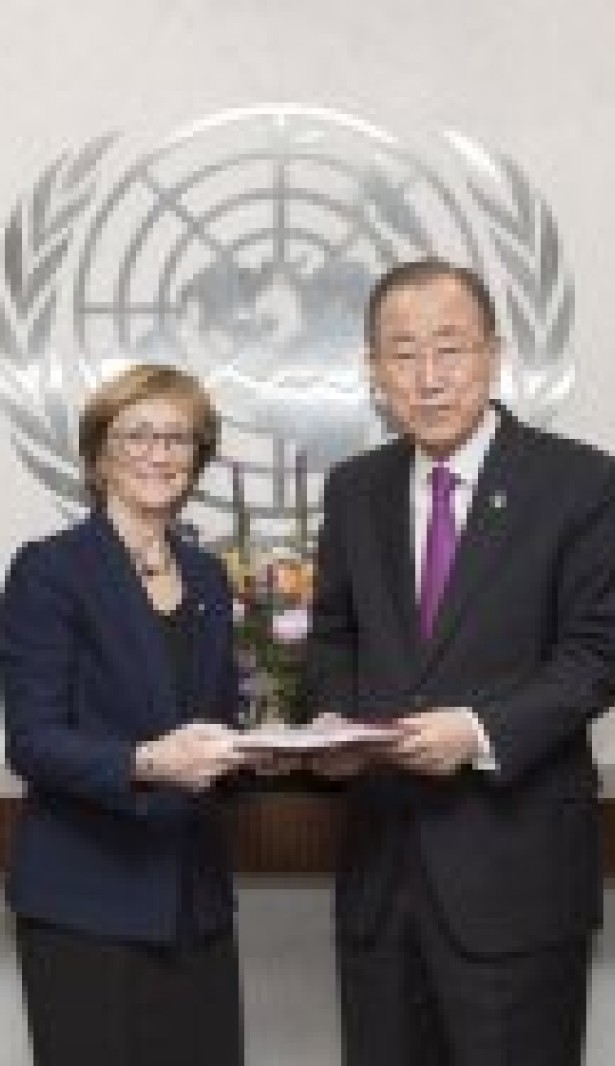Ban vows to act quickly after report finds UN failed to respond ‘meaningfully’ to Central African Republic abuse allegations
17 December 2015

Secretary-General Ban Ki-moon today pledged to urgently review the recommendations made by an independent panel that found that the United Nations did not act with the “speed, care or sensitivity required,” when it uncovered information about crimes committed against children by soldiers – not under UN command – sent to the Central African Republic (CAR) to protect civilians.
“The Report depicts a United Nations that failed to respond meaningfully when faced with information about reprehensible crimes against vulnerable children,” Mr. Ban said in astatement following receipt of the Report of the External Independent Review of the United Nations Response to Allegations of Sexual Exploitation and Abuse in the Central African Republic, which was made public today.
The review panel, chaired by Marie Deschamps, a former Justice of the Supreme Court of Canada, was set up by the Secretary-General in June to examine the UN response to the allegations of sexual exploitation and abuse of children by foreign military forces not under UN command and assess the adequacy of the procedures in place.
“I express my profound regret that these children were betrayed by the very people sent to protect them,” said Mr. Ban. “Though the soldiers who committed the abuses were not under United Nations command, the Report shows that the United Nations, which uncovered the abuse, did not subsequently handle the case with the speed, care or sensitivity required.”
The Report found that three UN officials abused their authority. Given the gravity of these findings, Mr. Ban said he will act quickly to determine what action might be necessary.
“To uphold the fundamental principle of accountability, and in the light of the history of allegations of sexual abuse by troops in the Central African Republic, including the current allegations, I had previously asked one of them – my Special Representative for the Central African Republic – to resign,” he stated, referring to Lieutenant General Babacar Gaye.
The Report also found that, while there were some shortcomings in the performance of several other UN officials and offices, they had not abused their authority.
“I believe that missteps by these individuals were largely a product of flawed systems. I intend to study these cases further to ensure that all individuals and offices heed the lessons of this review.”
Mr. Ban said he intended to urgently review the panel’s recommendations and act without delay to ensure that systemic issues, fragmentation and other problems are fully addressed. He stressed, however, that some of these recommendations will require the involvement and approval of Member States.
The Secretary-General recalled that over the years, the UN has put in place a host of measures to prevent sexual exploitation and abuse by its peacekeeping personnel, and to react robustly when violations occur.
“Still, it is clear that we must do much more, especially to better align our peacekeeping and human rights systems,” he stated. “As the report indicates, the handling of sexual exploitation and abuse is particularly complicated when, as in this case, troops are not under United Nations command.
“The United Nations does not have authority over contingents of troops that operate outside United Nations peacekeeping. This in no way diminishes the responsibility of the United Nations to speak out when other troops commit violations. Yet too often, national responses to allegations of abuse are slow, muted or non-existent. We must address this major weakness,” he continued.
“Victims do not care what colour helmet or uniform is worn by those who come to protect them. Our duty is to uphold the trust that must underpin all international engagements.”
The other members of the review panel are Yasmin Sooka, the Executive Director of the Foundation for Human Rights in South Africa, and Hassan Jallow, the Prosecutor of the UN International Criminal Tribunal for Rwanda (ICTR).
17 December 2015
Source: UN News Centre
“The Report depicts a United Nations that failed to respond meaningfully when faced with information about reprehensible crimes against vulnerable children,” Mr. Ban said in astatement following receipt of the Report of the External Independent Review of the United Nations Response to Allegations of Sexual Exploitation and Abuse in the Central African Republic, which was made public today.
The review panel, chaired by Marie Deschamps, a former Justice of the Supreme Court of Canada, was set up by the Secretary-General in June to examine the UN response to the allegations of sexual exploitation and abuse of children by foreign military forces not under UN command and assess the adequacy of the procedures in place.
“I express my profound regret that these children were betrayed by the very people sent to protect them,” said Mr. Ban. “Though the soldiers who committed the abuses were not under United Nations command, the Report shows that the United Nations, which uncovered the abuse, did not subsequently handle the case with the speed, care or sensitivity required.”
The Report found that three UN officials abused their authority. Given the gravity of these findings, Mr. Ban said he will act quickly to determine what action might be necessary.
“To uphold the fundamental principle of accountability, and in the light of the history of allegations of sexual abuse by troops in the Central African Republic, including the current allegations, I had previously asked one of them – my Special Representative for the Central African Republic – to resign,” he stated, referring to Lieutenant General Babacar Gaye.
The Report also found that, while there were some shortcomings in the performance of several other UN officials and offices, they had not abused their authority.
“I believe that missteps by these individuals were largely a product of flawed systems. I intend to study these cases further to ensure that all individuals and offices heed the lessons of this review.”
Mr. Ban said he intended to urgently review the panel’s recommendations and act without delay to ensure that systemic issues, fragmentation and other problems are fully addressed. He stressed, however, that some of these recommendations will require the involvement and approval of Member States.
The Secretary-General recalled that over the years, the UN has put in place a host of measures to prevent sexual exploitation and abuse by its peacekeeping personnel, and to react robustly when violations occur.
“Still, it is clear that we must do much more, especially to better align our peacekeeping and human rights systems,” he stated. “As the report indicates, the handling of sexual exploitation and abuse is particularly complicated when, as in this case, troops are not under United Nations command.
“The United Nations does not have authority over contingents of troops that operate outside United Nations peacekeeping. This in no way diminishes the responsibility of the United Nations to speak out when other troops commit violations. Yet too often, national responses to allegations of abuse are slow, muted or non-existent. We must address this major weakness,” he continued.
“Victims do not care what colour helmet or uniform is worn by those who come to protect them. Our duty is to uphold the trust that must underpin all international engagements.”
The other members of the review panel are Yasmin Sooka, the Executive Director of the Foundation for Human Rights in South Africa, and Hassan Jallow, the Prosecutor of the UN International Criminal Tribunal for Rwanda (ICTR).
17 December 2015
Source: UN News Centre

VIEW THIS PAGE IN:
